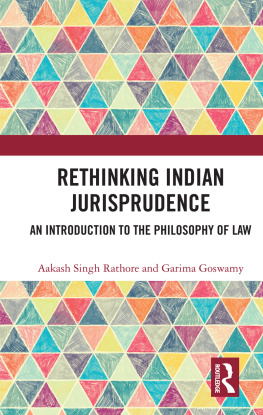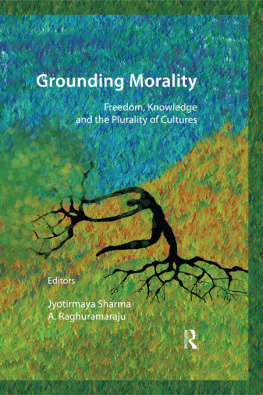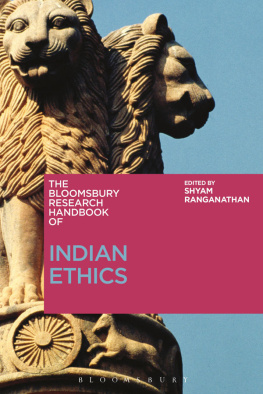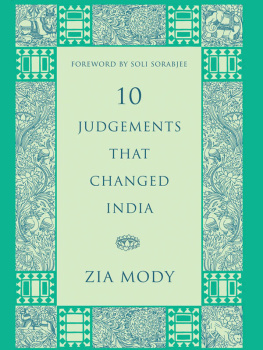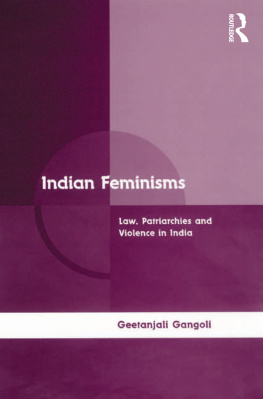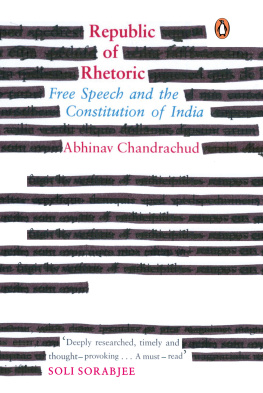Rethinking Indian Jurisprudence
What is law? What is the source of law? What is the law for? How does law differ from other norms or codes of conduct? What is the difference between law and morality? Who is obligated to follow the law and why? What is the difference between moral and legal obligation?
This book addresses these foundational questions about the law in general, and seeks to reorient our thoughts to the specific nature of law in India, the India of today, and the possible India of the future.
This volume:
- covers relevant foundational elements, concepts and questions of the discipline;
- brings the uniqueness of Indian Philosophy of Law to the fore;
- critically analyzes the major theories of jurisprudence;
- examines legal debates on secularism, rationality, religion, rights and caste politics; and
- presents useful cases and examples, including free speech, equality and reservation, queer law, rape and security, and the ethics of organ donation.
Lucid and accessible, the book will be indispensable to students, teachers and scholars of law, philosophy, politics as well as philosophy of law, sociology of law, legal theory and jurisprudence.
Aakash Singh Rathore specializes in Legal Theory (Post-Doctorate) and Comparative Constitutional Law (LL.M.), and is currently Visiting Professor at the Centre for Philosophy, Jawaharlal Nehru University, New Delhi, India. He is also an International Fellow of the Center for Ethics and Global Politics in Rome, Italy. His publications include Platos Labyrinth: Sophistries, Lies and Conspiracies in Socratic Dialogues (2018), Indian Political Theory: Laying the Groundwork for Svaraj (2017) and Indian Political Thought: A Reader (co-edited with Silika Mohapatra, 2010), also published by Routledge.
Garima Goswamy has taught Philosophy at Lady Shri Ram College, St Stephens College, Laxmibai College and Hansraj College, University of Delhi, and at BML Munjal University, India. Currently she works in the risk-consulting industry.
Legal philosophy has long been dominated by Western ideas and leading figures. This important new book surveys these concepts and contributions, and then brings them into conversation with indigenous Indian thought. The result is fascinating and opens up radically new perspectives for jurisprudence.
Thom Brooks, Professor and Chair of Law and Government and Dean at Durham Law School, UK
Finally a book which rights the wrongs inflicted upon Jurisprudence in Indian Law schools. Bridging classic western legal philosophy with Indian intellectual traditions and praxis, Rethinking Indian Jurisprudence will inaugurate a new pedagogical practice in law.
Kalpana Kannabiran, Professor and Director, Council for Social Development, Hyderabad, India
A lively, provocative, and accessible book, which encourages the reader to think on and explore further the mystery and miracle of legal philosophy, otherwise alien to the learning of modern law in India.
Upendra Baxi, Emeritus Professor of Law, University of Warwick, UK and Distinguished Professor of Law, National Law University, Delhi, India
Rethinking Indian Jurisprudence
An Introduction to the Philosophy of Law
Aakash Singh Rathore and Garima Goswamy

First published 2018
by Routledge
2 Park Square, Milton Park, Abingdon, Oxon OX14 4RN
and by Routledge
711 Third Avenue, New York, NY 10017
Routledge is an imprint of the Taylor & Francis Group, an informa business
2018 Aakash Singh Rathore and Garima Goswamy
The right of Aakash Singh Rathore and Garima Goswamy to be identified as authors of this work has been asserted by them in accordance with sections 77 and 78 of the Copyright, Designs and Patents Act 1988.
All rights reserved. No part of this book may be reprinted or reproduced or utilized in any form or by any electronic, mechanical, or other means, now known or hereafter invented, including photocopying and recording, or in any information storage or retrieval system, without permission in writing from the publishers.
Trademark notice: Product or corporate names may be trademarks or registered trademarks, and are used only for identification and explanation without intent to infringe.
British Library Cataloguing-in-Publication Data
A catalogue record for this book is available from the British Library
Library of Congress Cataloging-in-Publication Data
A catalog record has been requested for this book
ISBN: 978-1-138-63031-4 (hbk)
ISBN: 978-1-351-10665-8 (ebk)
Typeset in Sabon
by Apex CoVantage, LLC
Aakash Singh Rathore would like to dedicate his efforts behind and materialized in this book to current students of law in India, those future advocates, jurists and judges upon whom hundreds of millions of common citizens rely in their daily struggle to wrestle basic justice, equity and dignity from the merciless leviathan that is the modern state.
Garima Goswamy would like to dedicate this work to members of her family, including her dad (Kul Deepak Goswamy), mom (Geeta Goswamy) and elder brother (Vishal Goswamy), as well as to the memory of her late uncle Deepak Kumar Gaind (who introduced her to law), and to her late teacher, Chandrakanta Makhija (who introduced her to philosophy).
Contents
As far as we are aware, there are no published books on the Philosophy of Law in India. There is no shortage of literature on Indian jurisprudence in the sense that jurists mean when they analyze Indias legal system and case law and attempt to reflect on its more abstract implications the principles or even theories produced by the higher courts in the process of their legal reasoning. Some of this work is interesting and valuable. But we are not able to find a single text that deals with the philosophical background behind this jurisprudence, or the philosophical implications arising from out of this jurisprudence (at least, not since Chhatrapati Singhs Law from Anarchy to Utopia [1986], which is already three decades old and exceedingly difficult to find). Hence the clear pragmatic need for the present work.
This book, then, aspires to be no more than an introduction to the Philosophy of Law in India; indeed, it is at bottom just an attempt to inaugurate the Philosophy of Law in India. While we have innumerable jurists teaching jurisprudence in every Indian law school, the number of philosophers of law who teach the Philosophy of Law in philosophy, humanities and social science departments in India can easily be counted on one hand, with fingers to spare. We are aiming to provide at least one original Indian volume that may be used in these courses, and in order to be in a position to launch new ones. Hopefully many other such books, better, more comprehensive and more advanced ones, will follow. Only then can this neglected but exceptionally important discipline begin to flourish.
Even in the Indian law schools themselves, jurisprudence is abundant but it is far from flourishing. As will be explained at length in the Introduction, the current, standard form that jurisprudence in India takes is in desperate need of revision and reinvigoration. Lawyers are getting next to nothing out of it, and non-lawyers are getting nothing at all. It is hoped that this book, with its admittedly many flaws, will at least have the virtue of helping to rekindle the interest of law students in the intellectual core of their own discipline and trade.

